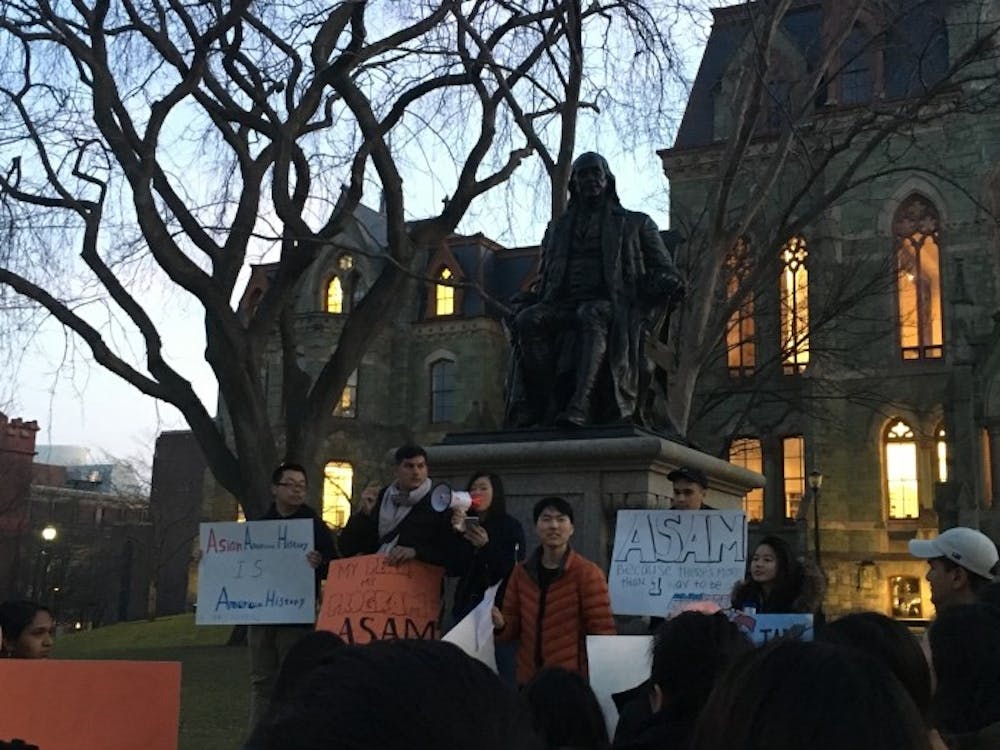
"Despite the College’s claims that it is 'firmly committed' to ASAM, their actions speak louder than official-sounding statements via email," DP columnist Jessica Li wrote in October. "Direct action must be taken to save this program that is essential to the fabric of our University."
Credit: Julia SchorrFormer longtime Director of the Asian American Studies program Grace Kao left for Yale University last January, and ASAM faculty and students have been demanding more administrative support and funding through petitions and protests. One year since Kao’s departure, the ASAM program is still without a formal director.
The year-long struggle to keep the program alive has sparked conversations about the importance of ethnic diversity in Penn’s curriculum and the struggles that many of these programs often face.
College senior and ASAM Undergraduate Advisory Board member Lindsey Lui said little progress has been made in addressing the board’s demands, and without a director, Lui said it is impossible for the program to move forward.
These types of programs face unique difficulties. Unlike a department, programs in the College of Arts and Sciences cannot hire their own faculty — they must rely on faculty members affiliated with other, larger departments to teach their courses. As a result of the structural differences between the two, programs are much more susceptible to issues regarding funding and support from the administration, according to several program directors.

Latin American and Latino Studies program Director Tulia Falleti, also a professor in the Political Science Department, said that while the program hasn’t had issues with funding, it does need more administrative support regarding faculty appointment and physical space for teaching.
Falleti explained that the College dean has been “very receptive” to the program’s needs, and allowed the program to hire an associate director two years ago. Yet, because of the lack of faculty associated with the program, the few faculty who hold leadership positions are left with “immense responsibilities.”

Tulia Falleti
“We have had about 20 to 22 cross-listed courses that are recognized as part of our LALS major and minor. These are taught by professors in other departments who have expertise in our area,” Falleti said. “It works for us, but it’s certainly not ideal.”
Transitioning from a program to a department with a body of standing faculty would be “very difficult,” she said.
“A decision to form a department on the study of a certain population is a discussion that goes beyond our department," Falleti said. "It’s a discussion many people in the University will have to have. But it’s a discussion worth having.”
Falleti said that there are many options that the program can explore, however, that aren’t as resource-demanding as forming a new department, yet still would be beneficial. For one, she said that having more post-doctoral candidates or fellows working for the program would be “fantastic."
She expressed hope that the program, along with ASAM, could move to a shared location for more teaching space.
Ethnic and geographical area studies departments, as opposed to programs, appear to be less affected by these issues.
Department Chair of East Asian Languages and Civilizations Nancy Steinhardt said that her department hasn’t experienced issues with a lack of administrative support and funding. She added that lack of physical space is a common problem across all departments and programs in the College.
Professor and Department Chair of Russian and East European Studies Mitchell Orenstein also said that his department hasn’t experienced the difficulties the ASAM program has faced.
Like Steinhardt, Orenstein said that ASAM’s struggles, particularly the challenge to hire a new director, are not problems that are necessarily unique to ethnic and minority studies at Penn, but instead to programs across all academic fields.
“Penn has a longstand[ing] commitment to area studies and continues to support area studies with its range of programs,” Orenstein said.
The Daily Pennsylvanian is an independent, student-run newspaper. Please consider making a donation to support the coverage that shapes the University. Your generosity ensures a future of strong journalism at Penn.
Donate







